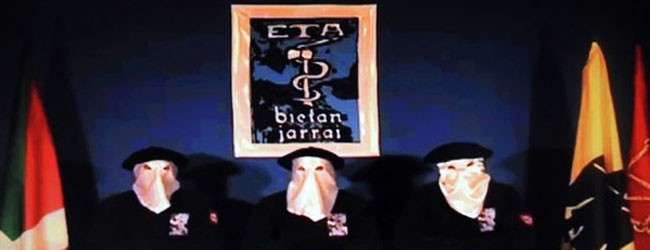1 October 2010
INTERNATIONAL THE ETA CEASEFIRE
An opportunity for peace in the Basque Country
BY EOIN Ó BROIN
ON September 5th, ETA declared an end to “offensive armed actions”. In its statement, the Basque independence organisation said “the Basque Country is at a crossroads [and] can now take the road to independence”.
The armed group confirmed its “commitment to finding a democratic solution to the conflict... to a democratic process to decide freely and democratically our future, through dialogue and negotiations”.
The reaction from the Spanish and Basque governments was sadly but predictably negative. The Madrid government’s Interior Minister Alfredo Perez Rubalcaba said: “We cannot trust them. The ministry’s anti-terrorist policy remains intact.”
His counterpart in the Basque Regional government, Adolfo Ares, said that the ceasefire was “totally insufficient and ambiguous. It is not an unconditional ceasefire.”
A more positive reading was offered by the pro-independence party in the Basque Country, Abertzale Left:
“ETA’s statement is a contribution of unquestionable value to the establishment of peace to achieve the resolution of the conflict.”
These sentiments were echoed by Sinn Féin President Gerry Adams. He said:
“The announcement of a ceasefire by ETA was the culmination of years of debate, discussion and strategising among Basque activists. It is a significant development and a genuine attempt to contribute to a resolution of the conflict.
“I believe it has the potential to bring about a permanent end to the conflict with the Spanish state.”
As part of Sinn Féin’s support for the emerging Basque conflict resolution process, South Belfast MLA Alex Maskey and Bairbre de Brún MEP have travelled again in the past couple of weeks to the Basque Country “to take soundings on the opportunities presented for developing the peace process”. The two senior republicans were also “keen to share experiences of peace building in Ireland”.
There was also support for the ceasefire from other international figures including former South African negotiator Roelf Meyer, who said:
“The solution is in dialogue and I think that the ceasefire declared by ETA has increased possibilities.”
In an interview with The Irish Times on September 18th, Rufi Etxeberria, a senior figure in the Basque independence movement, described the ceasefire as “unilateral and unconditional”. He said that there was no “prior agreement with the Government or political parties” and that ETA’s announcement “provides an essential context for dialogue and negotiation towards the resolution of the conflict”.
Etxeberria said the new strategy of the independence movement included “an irreversible commitment to exclusively peaceful and democratic means”. He said it was now up to the Spanish Government to state clearly whether they “recognise the national rights of the Basque Country, its right to self-determination”.
ETA’s last ceasefire ended in 2006 following the collapse of negotiations between the armed organisation and the Spanish Government. It was the second such collapse in a decade.
In each case, despite the positive climate created in the Basque Country by the cessations, the slow and negative response of the Socialist Party government of Jose Luis Zapatero in Madrid prevented the emergence of any meaningful conflict resolution process.
Batasuna, the pro-independence political party, remains illegal and its leaders, including Arnaldo Otegi, are still in jail. The Spanish courts continue to prosecute Basque nationalist political and social organisations for purely political activities. Basic political rights, such as freedom of assembly and opinion, are still limited.
Indeed, only a week after the ceasefire announcement, the Spanish courts banned a demonstration in Bilbao called by the civil society organisation Adierazi EH. The theme of the march, due to take place on Saturday, September 11th, was “human, political and civic rights for all”.
In an attempt to give the new situation some momentum, ETA released a second statement on Sunday, September 19th. The statement referred to ‘The Brussels Declaration’ signed in March 2009 by a variety of international figures including Archbishop Desmond Tutu, Mary Robinson, John Hume and the Nelson Mandela Foundation. The declaration calls on ETA to announce a permanent, unilateral, unconditional and internationally verifiable ceasefire and calls on the Spanish Government to make the appropriate response to any such move.
In their second statement, ETA stated its “respect and thanks” to the 40 signatories of the Brussels Declaration and urged them to help in securing “a just, permanent and democratic resolution of the Basque conflict”.
Again the Spanish Government responded negatively, telling the media: “This is not a time for statements but for ETA to give up and disband itself.”
While it is still in a very early stage, it is clear that progress towards a political solution to the conflict will be slow. The Spanish Government is increasingly dominated by hawkish elements such as Interior Minister Rubalcaba, who played a significant role in undermining the fledgling process in 2005 and 2006. In the Basque Country, the Socialists who control the regional government have abandoned an earlier support for dialogue.
Meanwhile, support for the ETA initiative from within the Basque nationalist community, while strong, will be dependent in the long run on the actions (or inactions) of the Spanish Government. As in Ireland, issues of dialogue, prisoners, militarisation and repression will all provide crucial litmus tests of Spain’s commitment to ending the conflict.
ETA’s latest initiative creates an opportunity, nothing more than that. It is now up to political leaders, including those in Madrid, to take the opportunity and piece together a solution to this conflict.
Follow us on Facebook
An Phoblacht on Twitter
Uncomfortable Conversations

An initiative for dialogue
for reconciliation
— — — — — — —
Contributions from key figures in the churches, academia and wider civic society as well as senior republican figures





